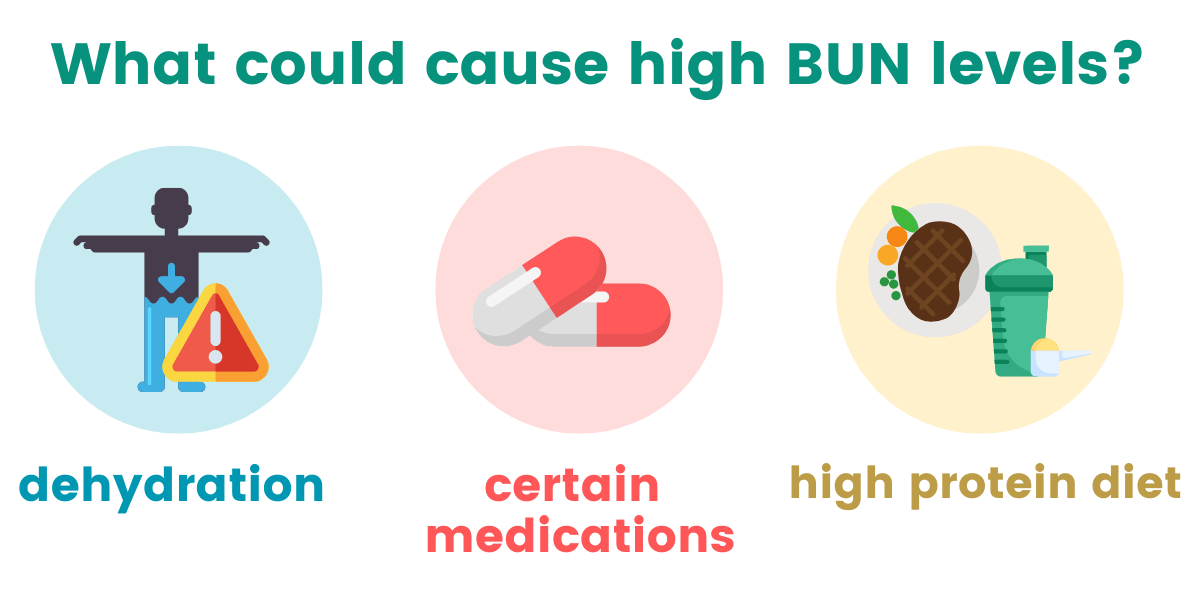- Why is a kidney function test done?
- How are kidney function tests done?
- What is eGFR and how is it calculated?
- What is Albumin/Creatinine (ACR) in a urine test?
- What is creatinine and what does it measure?
- What is a Blood Urea Nitrogen (BUN) test and what does it indicate?
- What does urinary protein tell me?
Why is a kidney function test done?
There are many reasons to take a kidney function test. You may have recently taken one as part of a routine health check up, or maybe your doctor is concerned about your kidney health because of high blood pressure, diabetes, or a chronic condition.
Kidney function tests can help catch kidney disease early on before having noticeable symptoms with tests like Albumin/Creatinine Ratio and BUN that specifically detect early signs of kidney decline.

How are kidney function tests done?
A kidney function test collects measurements from both a blood test and urine test.

A blood test, done in a Comprehensive Metabolic Panel (CMP), takes several measurements from your blood. Some can be used to assess kidney health.
A urine test, or Urinalysis, collects a sample of your urine and also takes several measurements to help evaluate your kidney health.
It can be overwhelming looking at all the medical jargon and numbers on test results. To further understand what these results mean, learning how your kidneys work can help you grasp these terms and numbers a little bit better.
Kidney Function Test Explained
1. What is eGFR and how is it calculated?
eGFR is measured using a blood sample. It can be used to determine how good your kidneys are at filtering waste from your blood. The “G” in eGFR stands for glomerulus. The glomerulus is where blood is filtered by the kidneys.
If filtration is compromised, the waste products that are supposed to make it through the filter and end up in your urine will remain in your blood. eGFR estimates this by measuring the amount of creatinine in your blood. Creatinine is a waste product of energy production in your muscles.
The normal range of eGFR results depends on your age:

If eGFR is higher than normal, this may indicate that you have slight kidney damage, but your kidneys are still functioning normally.
If eGFR is lower than normal, depending on how far below the normal range, you could have mild to severe loss of kidney function.

2. What is Albumin/Creatinine (ACR) in a urine test?
The Albumin/Creatinine ratio (ACR) is the best way to detect high amounts of protein in urine. It is one of the most reliable methods to determine if you have kidney disease. A spot urine sample is recommended to measure your ACR and can be part of a Urinalysis Panel. A spot urine sample is taken at any random time rather than a specific time (like only in the morning or collected over 24 hours). This ratio is determined by dividing the amount of albumin (in milligrams) by creatinine (in grams).

*A normal ACR for men is less than 17 mg/g and for women less than 25 mg/g
*An ACR of 30-300 mg/g for more than 3 months means you have Chronic Kidney Disease.
Albumin is one type of protein that passes through the kidneys and is excreted in urine. It is actually the most common type of protein in your blood because it is used to carry different things like hormones, vitamins, and enzymes to other parts of your body.
Proteins are one of those nutrients your body wants to add back to the bloodstream if it makes it through the filter in your glomerulus. A healthy kidney will reabsorb about 3g of albumin per day. A normal functioning kidney is able to reabsorb nutrients while letting waste products (like creatinine) pass along to your urine.
Only a small amount of protein should be found in urine, so if high amounts of albumin (albuminuria) are tested consistently (two positive tests over 3 or more months), then this is a sign of kidney damage. Albumin levels can be used as an early and sensitive indicator of kidney disease.
3. What is creatinine and what does it measure?
You may have heard of people supplementing creatine in hopes of making some extra gains in the gym. Well, creatinine is what’s leftover after your muscles use creatine and taking extra creatine may increase creatinine levels in your body. Animal products are also a source of creatine, so creatinine levels will elevate after eating that steak for dinner.
Creatinine production is a great way to tell how much muscle you have. As you get older, muscle mass typically decreases, so it is normal for creatinine levels to lower as you age. However, if creatinine levels decrease drastically, this could be a sign you have serious kidney problems.

Creatinine levels can either be measured in a kidney function test through a blood test in a Comprehensive Metabolic Panel (CMP) or through a urine test.
The creatinine measured in a CMP is referred to as serum creatinine, since it is the amount of creatinine present in your bloodstream.
The normal serum creatinine levels for:
Serum creatinine levels may not be ideal for detecting kidney impairment early on. Kidney function can be reduced by as much as 50% before serum creatinine increases.
Because creatinine is a waste product, it should be disposed of in urine (not reabsorbed). A urine test measures creatinine clearance, basically how much creatinine is excreted in your urine.
The normal creatinine clearance for:
However, because creatinine varies so much depending on your age, sex, and muscle mass, it is not the most reliable measurement to determine if you have kidney disease. eGFR (Estimated Glomerular Filtration Rate) is a more accurate measurement that accounts for these factors while still using creatinine levels.
Supplementing creatinine artificially raises the amount of creatinine your body produces in the absence of kidney dysfunction. So if you supplement creatine, creatinine levels may not be a reliable measurement for your kidney health.
4. What is a Blood Urea Nitrogen (BUN) test and what does it indicate?
First, BUN stands for Blood Urea Nitrogen. A BUN test is a blood test that measures the amount of urea nitrogen in your blood. When a BUN test is done in the United States, only the nitrogen part of urea is looked at. Urea is the main waste product from digesting and using the proteins from your diet. Normal kidneys are able to filter this waste product out of your blood efficiently.
Since the amount of protein you eat varies from day to day, BUN levels also fluctuate. Because of this, BUN can be used to indicate if you have kidney disease developing over time, but not for evaluating your kidney’s current health.
The normal range of BUN levels is 7-20 mg/dL.
Higher than normal BUN levels could be from dehydration, certain medications, or a diet high in protein. Average BUN levels also vary depending on age, typically increasing as you get older.

5. What does urinary protein tell me?
A small amount of protein in urine is normal, but if there’s a lot present, this could be a sign of kidney disease.
Proteinuria means having high levels of protein in your urine. Because albumin is the most common protein in blood and urine, proteinuria is also referred to as albuminuria (high amounts of albumin). Other proteins can make it into your urine as well, and the type and amount of these proteins depends on how damaged your kidneys are.
Short term explanations for high levels of urinary protein could be from dehydration, intense exercise, high stress, cold exposure, or having a fever.
Healthy kidneys will reabsorb proteins that make it through the filtration system. However, most proteins are too large to make it through the small filter holes of the glomerulus. If the glomerulus is damaged, too many proteins may escape. If the area of reabsorption in your kidneys is damaged, this could also lead to higher protein levels in urine.
Signs that you have high amounts of protein in your urine:
- foamy/bubbly urine
- Swelling in face, hands, feet, or stomach
- Needing to urinate more frequently

In conclusion, your kidneys play a massive role in regulating many areas of your health so it is important to make sure they are doing ok. Understanding and having access to test results like these allows you to make informed health decisions. By keeping track of your biomarkers with apps like Guava, this information is readily available at your fingertips to influence the direction of your health.







